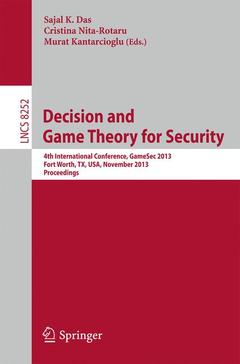Description
Decision and Game Theory for Security, 2013
4th International Conference, GameSec 2013, Fort Worth, TX, USA, November 11-12, 2013, Proceedings
Security and Cryptology Series
Coordinators: Das Sajal K., Nita-Rotaru Cristina, Kantarcioglu Murat
Language: English
Subjects for Decision and Game Theory for Security:
265 p. · 15.5x23.5 cm · Paperback
Description
/li>Contents
/li>Comment
/li>
On Communication over Gaussian Sensor Networks with Adversaries: Further Results.- A True Random Generator Using Human Gameplay.- A Game Theoretic Analysis of Collaboration in Wikipedia.- Controllability of Dynamical Systems: Threat Models and Reactive Security.- Adaptive Regret Minimization in Bounded-Memory Games.- The Cooperative Ballistic Missile Defence Game.- Security Games for Virtual Machine Allocation in Cloud Computing.- Monotonic Maximin: A Robust Stackelberg Solution against Boundedly Rational Followers.- Defeating Tyranny of the Masses in Crowdsourcing: Accounting for Low-Skilled and Adversarial Workers.- Quantifying Network Topology Robustness under Budget Constraints: General Model and Computational Complexity.- Mitigation of Targeted and Non-targeted Covert Attacks as a Timing Game.- New Efficient Utility Upper Bounds for the Fully Adaptive Model of Attack Trees.- Optimizing Active Cyber Defense.- Equilibrium Concepts for Rational Multiparty Computation.- Game-Theoretic Approach to Feedback-Driven Multi-stage Moving Target Defense.
Fast track conference proceedings
Unique visibility
State of the art research




